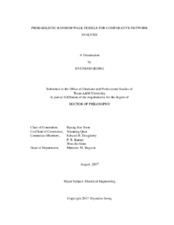Probabilistic Random Walk Models for Comparative Network Analysis
Abstract
Graph-based systems and data analysis methods have become critical tools in many
fields as they can provide an intuitive way of representing and analyzing interactions between
variables. Due to the advances in measurement techniques, a massive amount of
labeled data that can be represented as nodes on a graph (or network) have been archived
in databases. Additionally, novel data without label information have been gradually generated
and archived. Labeling and identifying characteristics of novel data is an important
first step in utilizing the valuable data in an effective and meaningful way. Comparative
network analysis is an effective computational means to identify and predict the properties
of the unlabeled data by comparing the similarities and differences between well-studied
and less-studied networks. Comparative network analysis aims to identify the matching
nodes and conserved subnetworks across multiple networks to enable a prediction of the
properties of the nodes in the less-studied networks based on the properties of the matching
nodes in the well-studied networks (i.e., transferring knowledge between networks).
One of the fundamental and important questions in comparative network analysis is
how to accurately estimate node-to-node correspondence as it can be a critical clue in
analyzing the similarities and differences between networks. Node correspondence is a
comprehensive similarity that integrates various types of similarity measurements in a
balanced manner. However, there are several challenges in accurately estimating the node
correspondence for large-scale networks. First, the scale of the networks is a critical issue.
As networks generally include a large number of nodes, we have to examine an extremely
large space and it can pose a computational challenge due to the combinatorial nature of
the problem. Furthermore, although there are matching nodes and conserved subnetworks
in different networks, structural variations such as node insertions and deletions make it difficult to integrate a topological similarity.
In this dissertation, novel probabilistic random walk models are proposed to accurately
estimate node-to-node correspondence between networks. First, we propose a context-sensitive
random walk (CSRW) model. In the CSRW model, the random walker analyzes
the context of the current position of the random walker and it can switch the random
movement to either a simultaneous walk on both networks or an individual walk on one
of the networks. The context-sensitive nature of the random walker enables the method
to effectively integrate different types of similarities by dealing with structural variations.
Second, we propose the CUFID (Comparative network analysis Using the steady-state
network Flow to IDentify orthologous proteins) model. In the CUFID model, we construct
an integrated network by inserting pseudo edges between potential matching nodes in
different networks. Then, we design the random walk protocol to transit more frequently
between potential matching nodes as their node similarity increases and they have more
matching neighboring nodes. We apply the proposed random walk models to comparative
network analysis problems: global network alignment and network querying. Through
extensive performance evaluations, we demonstrate that the proposed random walk models
can accurately estimate node correspondence and these can lead to improved and reliable
network comparison results.
Subject
Comparative network analysisRandom walk
Graph
Biological networks
Protein-protein interactions network
Network alignment
Network querying
Node correspondence
Citation
Jeong, Hyundoo (2017). Probabilistic Random Walk Models for Comparative Network Analysis. Doctoral dissertation, Texas A&M University. Available electronically from https : / /hdl .handle .net /1969 .1 /187223.
Related items
Showing items related by title, author, creator and subject.
-
Feng, Yixiao (2021-05-24)Network internal performance statistics are crucial for the control, operation and management of computer networks. This research work explores multiscale wavelet energy tomography using Discrete Wavelet Transform (DWT) ...
-
Kim, Seongbae (Texas A&M University, 1991)Not available
-
Seacat, Russell Holland (Texas A&M University. Libraries, 1974)


